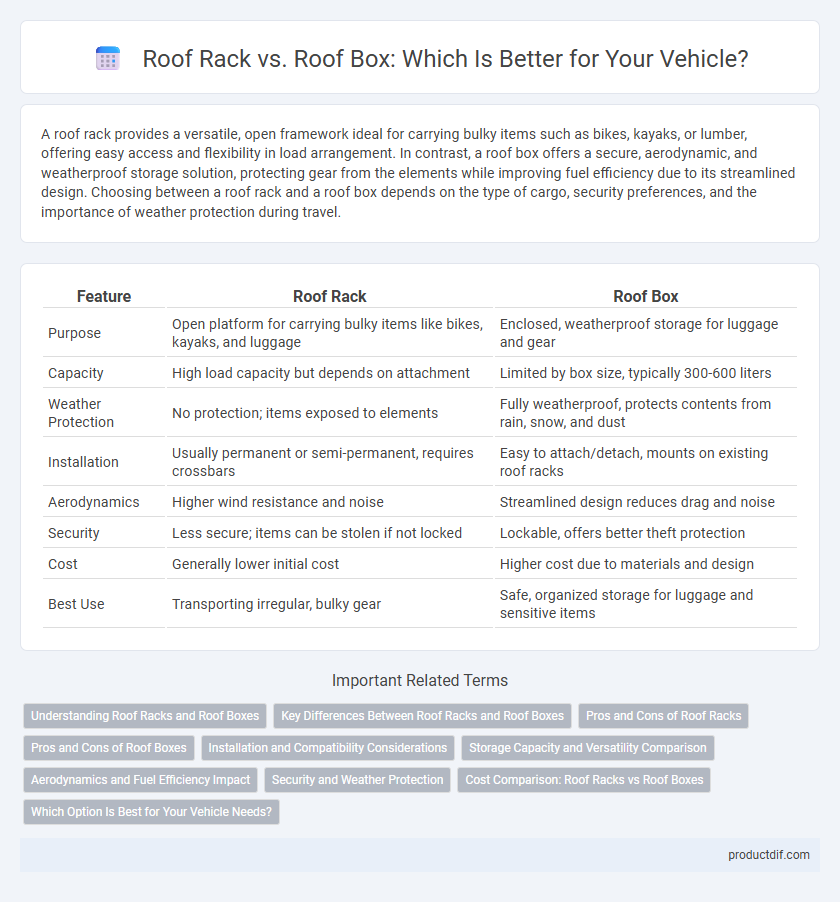A roof rack provides a versatile, open framework ideal for carrying bulky items such as bikes, kayaks, or lumber, offering easy access and flexibility in load arrangement. In contrast, a roof box offers a secure, aerodynamic, and weatherproof storage solution, protecting gear from the elements while improving fuel efficiency due to its streamlined design. Choosing between a roof rack and a roof box depends on the type of cargo, security preferences, and the importance of weather protection during travel.
Table of Comparison
| Feature | Roof Rack | Roof Box |
|---|---|---|
| Purpose | Open platform for carrying bulky items like bikes, kayaks, and luggage | Enclosed, weatherproof storage for luggage and gear |
| Capacity | High load capacity but depends on attachment | Limited by box size, typically 300-600 liters |
| Weather Protection | No protection; items exposed to elements | Fully weatherproof, protects contents from rain, snow, and dust |
| Installation | Usually permanent or semi-permanent, requires crossbars | Easy to attach/detach, mounts on existing roof racks |
| Aerodynamics | Higher wind resistance and noise | Streamlined design reduces drag and noise |
| Security | Less secure; items can be stolen if not locked | Lockable, offers better theft protection |
| Cost | Generally lower initial cost | Higher cost due to materials and design |
| Best Use | Transporting irregular, bulky gear | Safe, organized storage for luggage and sensitive items |
Understanding Roof Racks and Roof Boxes
Roof racks provide a versatile, open framework for securing various cargo types directly to a vehicle's roof, ideal for transporting bulky items like bikes and kayaks. Roof boxes offer enclosed, weatherproof storage that protects gear from elements while maximizing aerodynamic efficiency. Choosing between them depends on cargo type, security needs, and vehicle compatibility.
Key Differences Between Roof Racks and Roof Boxes
Roof racks consist of a framework mounted directly onto a vehicle's roof, providing a versatile base for carrying various cargo types such as bikes, kayaks, or luggage. Roof boxes are enclosed, aerodynamic containers that attach to roof racks, offering secure, weather-resistant storage and protection for items during travel. The key differences lie in their function: roof racks offer an open platform for bulky or irregularly shaped items, while roof boxes provide enclosed, lockable space optimized for organized and secure luggage transport.
Pros and Cons of Roof Racks
Roof racks provide flexible, open storage solutions ideal for carrying bulky items such as bikes, kayaks, or lumber. They offer easy accessibility and do not require extra storage space when not in use, but they expose cargo to weather conditions and may increase wind noise and drag, affecting fuel efficiency. Installation and load capacity vary by vehicle model, requiring proper mounting to ensure safety and stability.
Pros and Cons of Roof Boxes
Roof boxes offer increased cargo capacity and protection from weather, making them ideal for long trips and bulky items. They can improve aerodynamics compared to traditional roof racks but may add extra weight and affect fuel efficiency. Installation and access can be more cumbersome, and their larger size requires careful parking and storage considerations.
Installation and Compatibility Considerations
Roof racks typically require crossbars or mounting points integrated into the vehicle's roof, making compatibility with the car's make and model essential to ensure secure installation. Roof boxes often attach directly to these roof racks using clamps or quick-release systems but demand that the roof rack system supports the box's weight and size specifications. Checking load limits, vehicle roof shape, and crossbar spacing is crucial for safe and efficient installation of both accessories.
Storage Capacity and Versatility Comparison
Roof racks provide open, versatile storage ideal for oversized items such as bicycles, kayaks, and lumber, but they expose gear to weather and require secure strapping. Roof boxes offer enclosed, weatherproof storage with optimized space for luggage and smaller gear, protecting contents from elements and theft. Choosing between a roof rack and a roof box depends on the type and volume of cargo, with roof racks maximizing adaptability and roof boxes maximizing secure, aerodynamic storage capacity.
Aerodynamics and Fuel Efficiency Impact
Roof racks expose vehicles to increased air resistance, which can reduce fuel efficiency by up to 10% due to drag caused by external cargo. Roof boxes, designed with streamlined shapes, enhance aerodynamics by minimizing air turbulence, potentially limiting fuel consumption losses to around 5%. Choosing a roof box over a roof rack optimizes fuel economy by reducing aerodynamic drag during highway driving.
Security and Weather Protection
Roof boxes offer enhanced security with lockable designs and sturdy construction, safeguarding belongings against theft more effectively than open roof racks. Their aerodynamic, fully enclosed structure provides superior weather protection, preventing damage from rain, snow, and UV exposure. Roof racks, while versatile for oversized items, leave cargo exposed to environmental elements and are more susceptible to theft without additional security measures.
Cost Comparison: Roof Racks vs Roof Boxes
Roof racks generally have a lower initial cost, ranging from $100 to $300, depending on the vehicle and model, whereas roof boxes typically cost between $300 and $700 due to their enclosed design and materials. Installation expenses are similar for both, often requiring professional mounting to ensure safety and durability. Long-term value considerations include roof racks' versatility for carrying various items, while roof boxes offer better protection from weather but may add aerodynamic drag, impacting fuel efficiency.
Which Option Is Best for Your Vehicle Needs?
A roof rack offers versatile storage for oversized items like bikes and kayaks, while a roof box provides weatherproof, secure cargo space suitable for luggage and smaller gear. Choosing between a roof rack and roof box depends on your vehicle's compatibility, storage requirements, and the type of trips you frequently undertake. For off-road vehicles or outdoor enthusiasts, roof racks are ideal, whereas roof boxes suit families or travelers needing extra, protected capacity.
Roof Rack vs Roof Box Infographic

 productdif.com
productdif.com